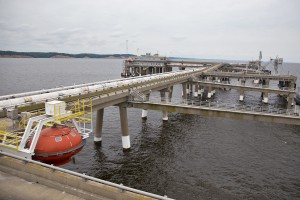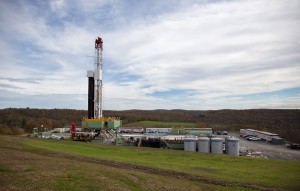Final hurdle cleared for Marcellus gas exports
-
Susan Phillips
The switch from an idled import terminal to an export facility results from a domestic shale boom, and greater need for energy abroad. Dominion has agreements with energy companies in India and Japan to liquefy natural gas, and ship it overseas. The Japanese company, Sumitomo, made a deal with Cabot Oil and Gas last December to purchase 350,000 MMBtu per day of natural gas from Cabot’s Marcellus wells and send it through pipelines to plant on Maryland’s Eastern Shore. That agreement is to last 20 years, signaling how much gas Cabot has within its holdings in Northeast Pennsylvania. Figures released in August by Pennsylvania Department of Environmental Protection show Cabot’s wells to be some of the most productive in the state.
New Life for an Idled Plant
The project breathes new life into the idled plant, which Dominion Energy spokesman Jim Norvelle says will create thousands of new construction jobs during the 3 year project, and 100 new full-time workers at the plant. He says Dominion will be paying an additional $40 million dollars in property taxes to Calvert County, MD.
But Dominion Energy, Cabot Oil and Gas, and Calvert County’s coffers aren’t the only winners. Utilities in Japan and India also stand to benefit. Benjamin Gage is an LNG analyst with IHS International. Gage says Marcellus Shale gas provides a dependable alternative to Middle East and Southeast Asian natural gas for Japan’s Sumitomo, as well as the Indian company Gail.
“The Japanese market gets a new source of natural gas not linked to the price of oil, but to the domestic market in the U.S.,” says Gage. “And Gail, the Indian company, is very much constrained by its gas supply and wants to diversify away from coal.”
Gage says the research shows it’s a wash when it comes to the impact on rate payers here in the U.S. “The consensus is that on a pennies on the MMBtu, (quantities of gas are measured by British Thermal units) the procurement costs (of natural gas) may increase slightly (for domestic utilities) but that’s outweighed by taxable revenue streams and jobs.”
The Climate Change Debate
American Petroleum Institute’s CEO Jack Gerard tells StateImpact that an export market for shale gas will mean increased production in Pennsylvania.
“And what that means – jobs, well paying jobs,” Gerard said. “These are careers, something we desperately need in our current economic state.”
But the increase in production is what angers environmentalists who say more fracking threatens Pennsylvania communities with pollution and disruption.
Jocelyn D’Ambrosio is an attorney with Earthjustice, which wanted FERC to examine both the environmental impact of more gas wells, as well as the project’s impact on greenhouse gas emissions. She says projects like these fly in the face of efforts to reduce the world’s reliance on fossil fuels at the expense of renewables.
“Just two weeks ago, we had 400,000 people marching in New York City to force more action on climate change,” said D’Ambrosio. “And yet FERC’s just ignored this reality and said it’s too difficult to estimate the climate effects of this project.”
D’Ambrosio says she plans to seek an emergency injunction to halt construction, and challenge FERC’s decision in federal court on that basis.
But Dominion spokesman Jim Norvelle says the project will actually help developing nations like India reduce their carbon footprint.
“This is a benefit for countries looking to clean their air by using natural gas rather than coal to generate electricity,” Norvelle told StateImpact.
Norvelle says construction could begin within weeks, with the plant coming online in the spring of 2017.


















